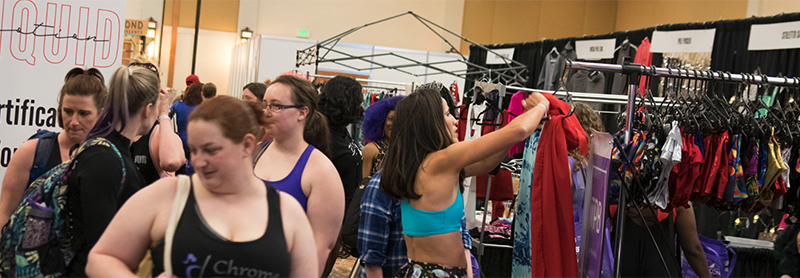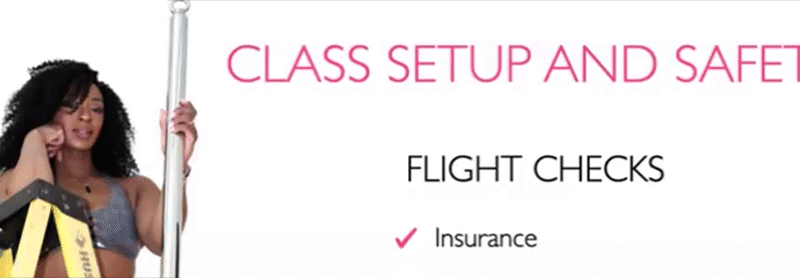A train-cation is a trip (usually away from home) where you focus for a specific…

How to set professional boundaries in pole businesses
The pole industry has a pervasive reputation for being friendly, especially with social media allowing us to share (and over share) our lives with the world. This can be great to really connect with students and it can also be great to attract new people to our industry. But what happens when that connection gets too close?
How do you gently remind your customers that have a professional business relationship first? Read more on setting professional boundaries in your pole business life.
Asses your boundaries (or lack thereof)
Start by making a list of what is important to you. Do you care that people know where you live? Or that you have a spouse? Maybe a baby? Do you care that people know your previous or current employment, including being a sex worker? Remember that your intended audience on social media is not always the people that are consuming your content, especially if your profile is public.
Some people care less about sharing previous employment but more about protecting their current family. Other people are very open about injuries (past and current) but will not share their political motivations. Still others don’t care what they share but will absolutely not respond to contacts (emails, DMs, etc.) after or before a certain time.
There is no wrong answer to this question, just concepts that are more relevant and more important to you.
Next, make a list of what you are being held accountable for your job.
If you work for a studio or other pole business, ask your boss or supervisor what they expect you to share on your social media and on what regularity. If you are an employee (learn about the difference between an employee and a contractor here) then your employer can ask you (within reason) to market your teaching at the studio perhaps with weekly posts. They may also request that you respond to emails or other requests within a certain amount of times or always be reachable during your teaching hours.
If you are a contractor, then check your contract. Some situations may require posting monthly or weekly such as for being a brand ambassador. If you manage and run your own business, you may be tempted to respond to emails, DMs, texts or other communications at all hours of the day or night and share everything about your life with your customers. In lieu of having a boss to talk to about this, try asking a trusted friend to help you determine the realistic boundaries of your job. Another opinion can be helpful, especially if you aren’t sure what your boundaries are.
If assessing your boundaries was hard, try to Identify when and how you feel stress or anger – these can be signs of overstepping boundaries.
Agree on priorities and set limits
Once you have assessed and made a list of things that are important to you and things that are relevant to your job, agree—either with your boss or with yourself as an entrepreneur—what your boundaries are.
For instance, do you respond to emails within 48 hours? Do you respond to DMs or emails only? Will you share movement-based posts but not family posts? Setting story settings to “close friends?” Maybe you’ll have a separate account from your personal life and use a different stage name to keep your pole and personal life private.
Whatever priorities and limits you have set, make sure that you communicate those boundaries clearly. That may mean amending a contract with your employer(s). That may mean making a public post on social media explaining how you prefer to be contacts, when, and what you are and are not going to continue to share.
If relevant, you may need to delegate some activities to help you maintain boundaries.
If you constantly find yourself running behind on things and will not work past a certain time, then you may need to hire some additional help. There is no shame in asking for help! Taking care of yourself and setting boundaries is important. An old adage says, “you can’t pour from an empty cup.” If you’re constantly overworking yourself and going beyond your established boundaries, you are more likely to be tired, angry, stressed and unable to provide the level of quality your customers—or even your family—expect from you. Setting appropriate boundaries, communicating them and delegating when you need help is better than burning out.
Saying “no” and preparing for push back
Setting boundaries is not easy especially for our ever-connected society and our friendly industry. There is often a strong desire to respond at all hours and to share a lot of ourselves in an effort to be transparent or honest in our dealings. If you are a “people-pleasing” type of personality or need the validation from your work and your networks to feel good about yourself, this issue can be even more magnified.
Once you set your boundaries, you must be prepared to say “no” when someone asks you to violate those boundaries. “No” can be hard at first but the more you practice, the easier it will become.
If you are new to setting boundaries, prepare for an adjustment period for yourself and for the people that have expectations from you. Stay the course and protect the things that are important for you. Your followers, employers and others will either adjust or decide that your relationship no longer works for them. And that is ok. Not every situation will be a positive one for your mental or financial well-being.
Recap
Setting boundaries is hard, especially in our industry, especially on social media and especially for entrepreneurs and other hustlers that feel the need to stay always connected with their work.
Take the time to determine what is important for you personally and then compare that with what you should be expected to do for your work. Set limits and communicate those limits with the people in your life that you work with or want to work with. Delegate or hire out work when you need to keep boundaries in check and prepare for push back whenever you practice saying “no” to something that violates your set boundaries.
Being clear about boundaries is being professional.



